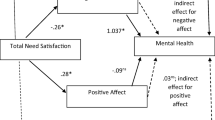Abstract
In this paper, based on the predictive processing approach to cognition, an enactive theory of need satisfaction is discussed. The theory can be seen as a first step towards a computational cognitive model of need satisfaction.
Access this chapter
Tax calculation will be finalised at checkout
Purchases are for personal use only
Similar content being viewed by others
References
Calvo, P., Friston, K.: Predicting green: really radical (plant) predictive processing. J. R. Soc. Interface 14(131), 20170,096 (2017)
Clark, A.: Whatever next? predictive brains, situated agents, and the future of cognitive science. Behav. Brain Sci. 36(3), 181–204 (2013)
Clark, A.: Surfing Uncertainty: Prediction, Action, and the Embodied Mind. Oxford University Press, Oxford (2015)
Gasper, D.: Conceptualising human needs and wellbeing. In: McGregor, J.A. (ed.) Gough I, New Approaches and Research Strategies, pp. 47–70. Cambridge University Press, Wellbeing in Developing Countries (2007)
Hohwy, J.: Attention and conscious perception in the hypothesis testing brain. Front. Psychol. 3, 96 (2012)
Hohwy, J.: The Predictive Mind. Oxford University Press, Oxford (2013)
Human, S., Fahrenbach, F., Kragulj, F., Savenkov, V.: Ontology for representing human needs. In: Rózewski, P., Lange, C. (eds.) Knowledge Engineering and Semantic Web, pp. 195–210. Springer, Cham (2017)
Maslow, A.: Motivation and Personality. Harper & Row, New York (1970)
Acknowledgement
This research was partially supported by the WU Anniversary Fund of the City of Vienna and by the Austrian Federal Ministry for Transport, Innovation and Technology (Grant 855407).
Author information
Authors and Affiliations
Corresponding author
Editor information
Editors and Affiliations
Rights and permissions
Copyright information
© 2018 Springer Nature Switzerland AG
About this paper
Cite this paper
Human, S., Bidabadi, G., Peschl, M.F., Savenkov, V. (2018). An Enactive Theory of Need Satisfaction. In: Müller, V. (eds) Philosophy and Theory of Artificial Intelligence 2017. PT-AI 2017. Studies in Applied Philosophy, Epistemology and Rational Ethics, vol 44. Springer, Cham. https://doi.org/10.1007/978-3-319-96448-5_5
Download citation
DOI: https://doi.org/10.1007/978-3-319-96448-5_5
Published:
Publisher Name: Springer, Cham
Print ISBN: 978-3-319-96447-8
Online ISBN: 978-3-319-96448-5
eBook Packages: Computer ScienceComputer Science (R0)



